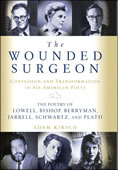|
Rather than being essentially new,
a definitive break with nineteenth-century Romanticism --
as Eliot and Pound had declared --
Jarrell
argued that
"'Modern' poetry is, essentially, an extension of romanticism;
it is what romantic poetry wishes or finds it necessary to become."
The essay goes on to catalogue at length the continuities between Romantic and Modernist poetry:
"very interesting language, a great emphasis on connotation, 'texture';
extreme intensity, forced emotion -- violence; a great deal of obscurity
... experimental or novel qualities of some sort,"
... They can be reduced to a common denominator:
both Romantic and Modernist poetry,
Jarrell suggests,
strive for ever more complex and difficult expressions.
In its language, emotions, and organization, Modernism exponentially multiplies
the strangeness and difficulty of poets like Wordsworth and Shelley
... a "quantitative change," not a qualitative one.
The Modernists were not revolutionaries as they believed,
but inheritors,
and their poetry represented not a new beginning but "The end of the line"
[as Jarrell later entitled a revised version of his essay]
[p. 155-156].
|
 Highlights of Poetry.
Highlights of Poetry.
 Index of poetry.
Index of poetry.
 How to Write Poetry.
How to Write Poetry.
 Books read.
Books read.
 Haibun.
Haibun.
 Haiku.
Haiku.
 Hay(na)ku.
Hay(na)ku.
 Rengay.
Rengay.
 Tanka.
Tanka.
 Tanka surveys.
Tanka surveys.
 Concrete.
Concrete.
 Ghazal.
Ghazal.
 Lai.
Lai.
 Pantoum.
Pantoum.
 Prose poem.
Prose poem.
 Rondeau.
Rondeau.
 Rubáiyát.
Rubáiyát.
 Sestina.
Sestina.
 Skaldic verse.
Skaldic verse.
 Sonnet.
Sonnet.
 Terza rima.
Terza rima.
 Triolet.
Triolet.
 Tritina.
Tritina.
 Villanelle.
Villanelle.
 J. Zimmerman.
J. Zimmerman.
 J. Zimmerman (haiku).
J. Zimmerman (haiku).
 J. Zimmerman (tanka).
J. Zimmerman (tanka).

